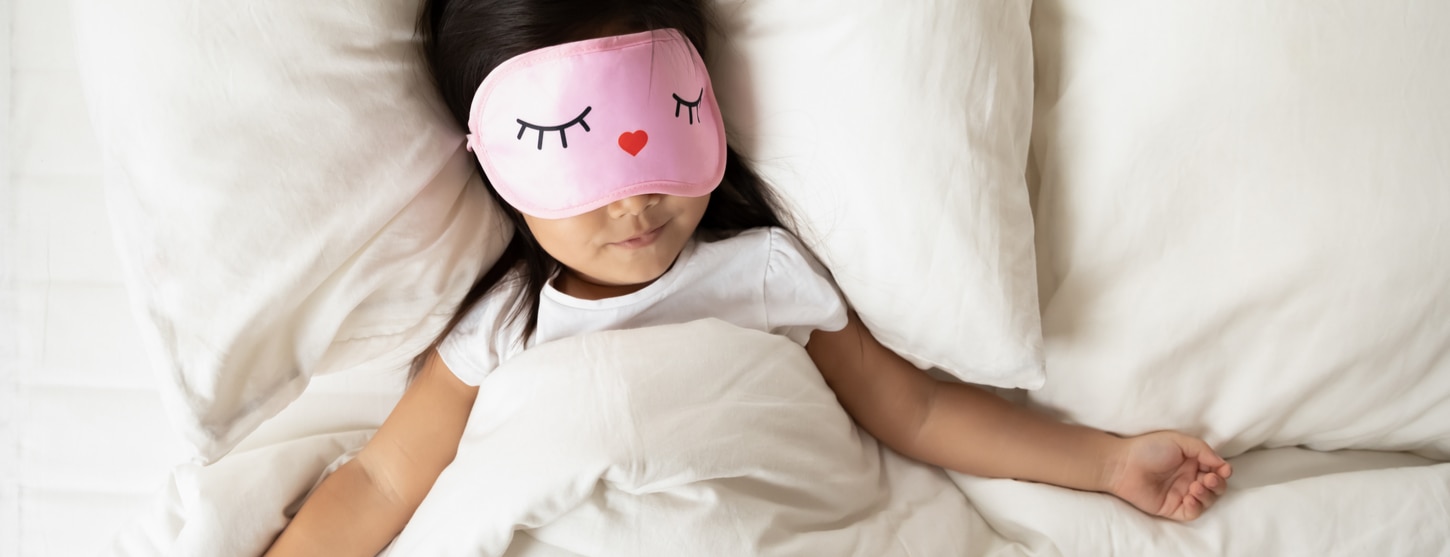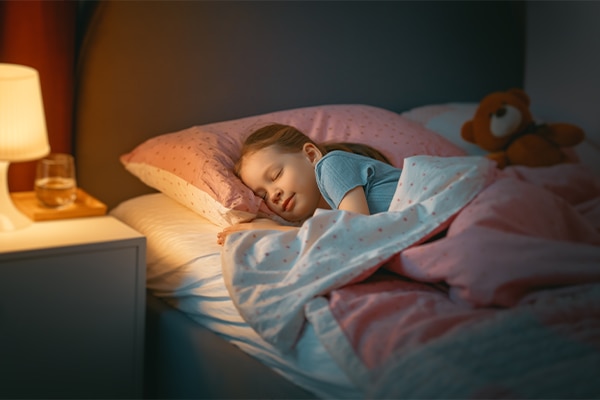15% off £40
How much sleep do children need?

We all need sleep to be able to function, but we don’t all need the same amount of it, especially where children are concerned.
The amount of time they should ideally sleep is mainly determined by how old they are.
Developing minds and bodies, school work, homework, exam revision and pressure, out of school activities and just generally being always-switched-on, can easily wear children out.
Constantly learning about and progressing through life is a full-on thing, and no sooner are children going to sleep, they’re waking up and doing it all over again.
Why is sleep important for children?
It’s something we all do without giving it a second thought, but why do we need to sleep and what role does it play in children’s lives?
The answer - good sleep is important for children’s overall physical and mental wellbeing.1
Sleep plays a key role in children’s overall development.
Not only can it help improve mood, but it’s also been widely associated with affecting how alert children are and their ability to focus.
It’s also been linked to influencing their wider cognitive performance, resiliency and rate at which they learn.2
Not getting enough sleep as a child can have a wide-reaching impact, which isn’t too dissimilar to how adults feel when they are sleep deprived.
More specifically, when it comes to children and sleep, not getting enough of it can potentially reduce attention spans.
This can have a wider knock-on effect on overall learning and performance in the process, especially if the sleep deprivation is on-going.3
According to the American Academy of Paediatrics, a quarter of children under the age of five don’t get their full quota of sleep (more on recommended sleep hours below).
Poor sleep during early childhood has been associated with allergic rhinitis, immune system issues and anxiety.
Meanwhile, further recent research has found that not getting enough sleep when you are younger may lead to increased risk of cardiovascular issues; more specifically obesity, diabetes and high blood pressure.


Lack of sleep can also impact adolescents too, mainly by having a detrimental impact on their academic studies and mental health.
Interestingly, while teenagers are renowned for sleeping a lot, the need for sleep is actually caused by physical changes that take place during puberty.
Teenagers’ natural circadian rhythm (the body’s 24-hour sleep-wake cycle) alters, making it more difficult for them to drop off before 11pm, which then has a knock-on effect on their ability to rise and shine first thing in the morning.4
Summary
- A good night’s sleep is important for children’s overall physical and mental wellbeing
- Sleep plays a key role in children’s development, right from the moment they’re born, through to their teenage years
- Not getting enough sleep can potentially reduce children’s attention span. This can have a wider knock-on effect on their overall learning and performance
Regularly not getting enough sleep can take its toll on us all, children included.
And if it happens for a sustained period of time, then it can start to show physically, mentally and emotionally.
Common signs of sleep deprivation among children include:
- Finding it difficult to wake up in the morning.
- Falling asleep after being woken up and needing to be repeatedly woken up after that.
- Yawning frequently during the day.
- Complaining of feeling tired or needing a nap during the day.
- Wanting to lie down during the day, even if it means missing out on activities with friends and family.
- Falling asleep or seeming drowsy at school or at home.
- Wanting to regularly eat unhealthy stimulants, such as caffeine and sugar.5
- Lacking interest, motivation and attention for everyday tasks.
- Increased forgetfulness.
- Blurred vision.
- Struggling to learn new information.
- Increased moodiness and irritability.
- Increased impulsivity.
- Increased stress throughout the day.
- On-going deprivation shows on children physically, mentally and emotionally
- Physical signs include: struggling to wake up in the morning and yawning all day
- Mental signs include: lack of motivation and having difficulty learning new things
- Emotional signs include: increased moodiness and stress
What are the benefits of sleep for children?
Sleep is just as important for children as it is for adults. More specifically, adequate sleep among children can:
-
Improve growth
According to a research review on infant sleep and its connection with cognition and growth published in 2017, infant sleep plays a critical and positive role in cognition and physical growth.
Ten studies on infant sleep and cognition were included in the review. It was concluded there is a positive link between sleep, memory, language, executive function, and overall cognitive development in typically-developing infants and young children.6
-
Prevent obesity
Lack of sleep can lead to unhealthy weight gain, particularly among children and adolescents, who need more sleep than adults.
Researchers found that short sleep duration triggers metabolic changes that may be linked to obesity.
It’s believed sleep during childhood and adolescence is particularly important for brain development, and that insufficient sleep in youngsters may adversely affect the function of a region of the brain, known as the hypothalamus, which regulates appetite and energy levels.7
-
Fight illness
When we sleep, we all produce proteins called cytokines that help our body to fight infection, illness, and stress. Too little sleep can impact our cytokine levels.
While limited data on young children exist, some studies involving teenagers have found that reported bouts of illness can be reduced if teens sleep for longer.8
-
Reduce injuries
Research has found that children are clumsier and more impulsive when they sleep less, making them more prone to accidents and injuring themselves.
A study that focused on the association between sleep and injuries among school-aged children in China concluded that sleep disturbance was significantly higher among children, who had injured themselves compared to children who hadn’t injured themselves.
The study examined 182 children, who had, had a medically-attended injury in the previous 12 months, and 207 non-injured control children.9
-
Boost attention span
According to research published in 2011 that explored children's sleep, sleepiness and performance on cognitive tasks, children experience cognitive dysfunction that is related to their sleep.
As is the case with adults, children with many clinical-level sleep disorders tend to perform relatively poorly on cognitive tasks.
What’s more, children may accumulate sleep debt on a regular basis which, over time, can lead to a chronic state of sleep insufficiency.
The researchers also concluded that rather than sleeping for the recommended 9 to 10 hours a night, the school-age children they observed were averaging around 7.5 hours.10
Summary
- Sleep has been linked to numerous widespread benefits for children
- They include boosting growth and attention span, to fighting illness and reducing injuries
The amount of sleep a child needs largely depends on their age.
While the amount may change as they get older, the importance of getting their recommended quota of sleep still remains.11
- New borns14 - 17 hours a day
- Infants (up to 12 months) 12 - 15 hours a day
- Toddlers (1 - 2 years) 11 - 14 hours a day
- Pre-schoolers (3 - 5 years) 10 - 13 hours a day
- School-age children (6 - 12 years) 9 - 12 hours a day
- Teenagers (13 - 17 years) 8 - 10 hours a day
What time should 12-year-olds go to bed?
According to the NHS, children between the age of 6 and 12 need around 9 to 12 hours of sleep.
How much they need exactly will depend on what time they go to bed.12
For example, if your 12-year-old needs to wake up at 7am every day, then they ideally need to go to sleep by 7pm (for the maximum 12 hours’ sleep).
How much sleep should a teenager get?
It depends on the individual, but most teens need between 8 and 10 hours’ sleep a night.
This is due to the fact they are going through a second developmental stage of cognitive maturation.
Additional sleep supports their developing brain, as well as physical growth spurts.13
What time should a 5-year-old go to bed?
Five-year-olds typically need between 10 and 13 hours’ sleep a night.
You may find it’s more like 13 hours than 10 hours if they’ve had a particularly busy day or have spent lots of time learning, which can be mentally tiring.
How much sleep does a 10-year-old need?
The general guidance is that 10-year-olds, as school-age children, need between 9 and 12 hours of sleep a night.
For example, if your child needs to wake up for school at 7am, he/she will need to be in bed before 9pm.
Summary
- The amount of sleep a child needs is largely determined by how old they are
- Younger children (e.g. new-born babies and infants need the most) – 12 to 17 hours a day
- School-age children need 9 to 12 hours a day
- Teenagers need between 8 and 10 hours a day
Sleep tips for children
Good sleep routines are something we can all benefit from and can be implemented by parents to help make sure their children get the recommended amount of sleep every night.
One of the most important things is making sure you get into the habit of doing the same, or very similar thing, every night, at the same time, which will help your child get into the sleep mindset that bit easier.
It will also help reinforce the importance of getting plenty of sleep too.
Sleep tips for children
Sleep tips for children
Good sleep routines are something we can all benefit from and can be implemented by parents to help make sure their children get the recommended amount of sleep every night.
One of the most important things is making sure you get into the habit of doing the same, or very similar thing, every night, at the same time, which will help your child get into the sleep mindset that bit easier.
It will also help reinforce the importance of getting plenty of sleep too.


- Run them a warm bath (don’t make it too hot) that will help them to relax.
- Dim the lights, which will encourage the production of the sleep hormone, melatonin.
- Once in bed, read to them, or read a book together.
- Alternatively, let them listen to some relaxing music turned down low.
- Try some basic breathing exercises (depending on their age).
- Get them to stop watching the TV and using any electronic devices an hour before bed.
- Make their bedroom a screen-free zone.
- Put up some blackout blinds or curtains that are designed to fully block out daylight.
- Make sure their room is the right temperature – around 16 to 20C.
- Clear their room of any unnecessary clutter.14
Tips for sleeping in the heat
The current climate situation means that your children may have to sleep during hot weather more often.
This isn’t always ideal if you live in the UK, as most of our houses aren’t built for this kind of weather.
But don’t fear! There are some things you can do to help combat the heat, check them out:
- Block out the light – it sounds super obvious we know, but it can be easy to forget while you’re out enjoying the sun. Make sure that curtains or blinds are closed and open the window slightly to freshen the room.
- Cool the room down – if you have an electric fan that isn’t too noisy, you could trial using it in your little one’s bedroom at nighttime. Just remember not to aim it at their bed!
- Keep them hydrated – with all the fun in the sun staying hydrated might not have been on the cards for your kids. So try to keep them well stocked with some chilled water near their bed.
- Use light bedding and nightwear – synthetic pyjamas and bedding might cause your kids to get a little too warm, so it’s best to stick to the natural, lightweight fabrics like cotton.
- Try a bedroom thermometer – if you’re struggling to assess how hot their room is, using a bedroom thermometer will help you to get their room to the ideal temperature range for a more comfortable snooze.15
Final thoughts on how much sleep children need
Sleep is one of the main building blocks in enabling children to develop and grow and function every day as healthily as possible. Not only does it enable them to process and consolidate what they’ve learnt during the day, it also helps make sure they feel ready to go again the next day; their attention span is good, their brain feels ready to learn and they have the energy to do so.
The recommended sleep hours guidance for children is based on how old they are. Generally speaking, very young babies and children require that bit more sleep because they are rapidly growing.
However, this doesn’t mean sleep isn’t fundamental for toddlers, pre-schoolers, school-age children and teenagers, it also plays a pivotal role in enabling them to function well every day. This includes making sure they feel refreshed enough to wake up at the right time and cope with whatever each day brings.
Having a regular routine that follows a similar pattern every night is really important for enabling good sleeping habits to be formed, and for the recommended quota of sleep to be reached every night.
These routines don’t have to be complex and can include simple tips, such as making sure the bedroom is set up for sleep (e.g. it’s not too hot and cold, is free of TVs, devices and other technology and is dark enough) and relaxing before bed (e.g. by having a warm bath and reading or listening to calming music just before you switch the light off).
Could you be better with your sleep regime? Maybe you frequently struggle to drop off or find you keep waking up throughout the night?
If that’s the case, have a read of this article, '12 ways to develop a sleep hygiene’, which contains plenty of practical insight, including how to tell if you have poor sleep hygiene, as well as good sleep hygiene tips.
- https://www.nhs.uk/live-well/sleep-and-tiredness/healthy-sleep-tips-for-children/
- https://www.sleepfoundation.org/children-and-sleep
- https://www.sleepfoundation.org/children-and-sleep
- https://www.hopkinsmedicine.org/health/wellness-and-prevention/teenagers-and-sleep-how-much-sleep-is-enough#:~:text=According%20to%20Johns%20Hopkins%20pediatrician,they%20needed%20at%20age%2010.
- https://www.aboutkidshealth.ca/article?contentid=645&language=english
- https://www.ncbi.nlm.nih.gov/pmc/articles/PMC5440010/
- https://www.ncbi.nlm.nih.gov/pmc/articles/PMC2082964/
- https://www.sciencedaily.com/releases/2013/11/131114122105.htm
- https://pubmed.ncbi.nlm.nih.gov/17658297/
- https://www.ncbi.nlm.nih.gov/pmc/articles/PMC4180085/
- https://www.sleep.org/how-sleep-works/how-much-sleep-children-need/
- https://www.nhs.uk/live-well/sleep-and-tiredness/how-much-sleep-do-kids-need/
- https://www.hopkinsmedicine.org/health/wellness-and-prevention/teenagers-and-sleep-how-much-sleep-is-enough
- https://www.nhs.uk/live-well/sleep-and-tiredness/healthy-sleep-tips-for-children/#:~:text=Relaxation%20tips%20to%20help%20sleep&text=A%20warm%20(not%20hot)%20bath,or%20read%20a%20story%20together.
- https://www.nct.org.uk/baby-toddler/getting-out-about-your-baby/summer-your-baby/keeping-kids-cool-hot-weather-eight-tips
The advice in this article is for information only and should not replace medical care. Please check with your GP or healthcare professional before trying any supplements, treatments or remedies. Food supplements must not be used as a substitute for a varied and balanced diet and a healthy lifestyle.













